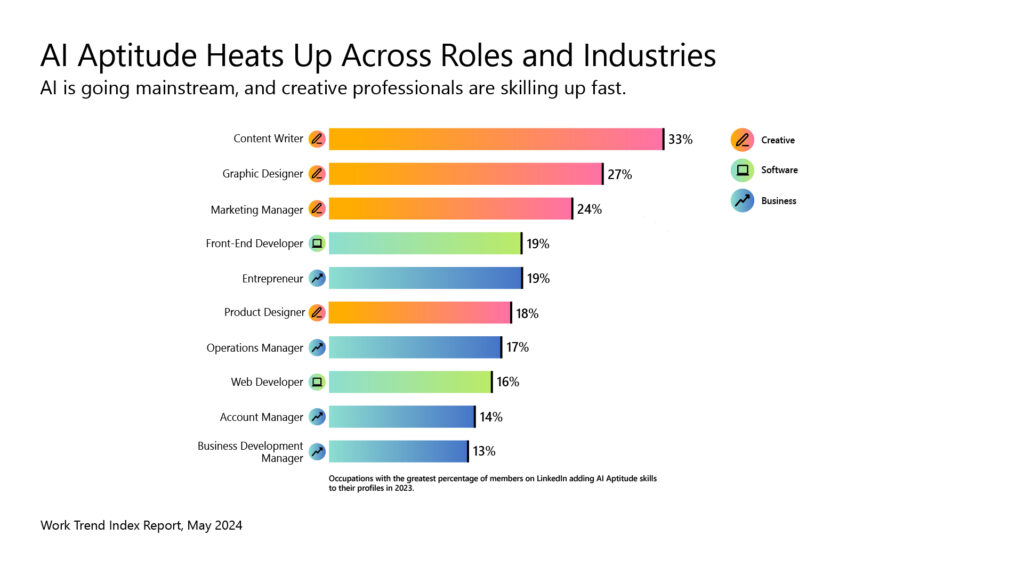By Katiana Krawchenko
Tips and Tools for Professional Growth
This year has proven AI at work is here to stay, according to top industry analysts, and among those working to elevate their skills the most are creative communications professionals.
That’s according to a recent study by Microsoft and LinkedIn, whose 2024 Work Trend Index Annual Report found that Content Writers, Graphic Designers and Marketing Managers are adding AI Aptitude skills to their LinkedIn profiles at much higher rates than any other occupation. Check out the graphic below for the full breakdown. Researchers surveyed 31,000 people across 31 countries for this study, identifying labor and hiring trends from LinkedIn, and analyzing trillions of Microsoft 365 productivity signals as well as research with Fortune 500 customers.

What is AI? Artificial Intelligence is “a technology that allows you to generate, classify, and perform tasks like image analysis and speech recognition,” according to industry leader Google. “AI systems learn and improve through exposure to vast amounts of data, identifying patterns and relationships that humans may miss.”
Before we get into just how communications professionals are using these tools, let’s first take a look at overall trends. According to the 2024 Work Trend Index Annual Report released in May:
- Users say AI helps them save time (90%), focus on their most important work (85%), be more creative (84%), and enjoy their work more (83%).
- 78% of AI users are bringing their own AI tools to work (BYOAI)—it’s even more common at small and medium-sized companies (80%). And it’s not just Gen Z—BYOAI cuts across all generations.
- 52% of people who use AI at work are reluctant to admit to using it for their most important tasks.
- 66% of leaders say they wouldn’t hire someone without AI skills.
- 71% say they’d rather hire a less experienced candidate with AI skills than a more experienced candidate without them.
- Globally, skills are projected to change by 50% by 2030 (from 2016)—and generative AI is expected to accelerate this change to 68%.
- More than two-thirds (68%) of this year’s LinkedIn’s Jobs on the Rise (fastest-growing roles in the US) didn’t exist 20 years ago.
Source: 2024 Work Trend Index Annual Report from Microsoft and LinkedIn
So, how are communicators using AI? We checked in with our WCA community to see how they’re using these platforms. Copywriting, content creation, data analysis and even building editorial calendars for clients are popular among us. So are transcription and translation programs.
Overall, WCA-ers see AI as a starting point, rather than a definitive way to produce a final product. Keeping trust and ethics top of mind for their clients, our users say they enjoy the back and forth with Generative AI platforms like OpenAI’s ChatGPT, Google’s Gemini and Microsoft’s Copilot that can help remove writer’s block, but always ensure that what they churn out is by and large human-ized.
Here are some other specific tools popular among WCA-ers:
- Perplexity – “A free AI search engine.”
- Otter – “Get transcripts, automated summaries, action items, and chat with Otter to get answers from your meetings.”
- Grammarly – “Work with an AI writing partner that helps you find the words you need—to write that tricky email, to get your point across, to keep your work moving.”
- WordTune – “Rephrase sentences easily and explore fresh rephrase suggestions to level-up your writing.”
- Canva’s Magic Media – “Lets you turn your imagination into reality by watching your words transform into stunning, one-of-a-kind images – and now videos and graphics, too.”
- DeepL – “Precise and efficient language translation.”
Of course, it must be noted that plenty of skepticism exists at the advent of this new era of the internet, including concerns about data privacy, trustworthiness, and security. Corporations, organizations, government bodies and individuals alike are working to ensure the information isn’t being misused.
The accelerating integration of AI into work life will be a transformative shift and communicators are leading the charge in upskilling and recognizing the importance of AI proficiency in their roles. While the benefits of AI—such as saving time and fostering innovation—are clear, the ongoing concerns surrounding ethics, data privacy, and trust cannot be overlooked. As the landscape continues to evolve, communicators should navigate this new terrain with a balanced approach, ensuring that technology complements human creativity rather than replaces it. By embracing AI thoughtfully, the creative communications industry can harness its full potential while maintaining integrity and authenticity in their work.
Blog Author:
 Katiana Krawchenko specializes in nationwide TV and radio outreach, client management and strategic broadcast media plan development in her position as senior director of broadcast media at the DC-based public affairs agency, Avoq. Prior to joining the team, Katiana served as a CBS News White House producer, traveling around the U.S. and to several countries covering President Trump. She previously worked with CBS affiliate services, CBS This Morning and the CBS political unit, covering the 2016 election. Katiana hails from Winnipeg, Canada, and found her way to Austin in 2023 after working in Washington, D.C., at Avoq for three years. She spends her spare time cuddling her rescue dogs, Binkie and Linguini, and hanging the esoteric art she regularly finds on the street and at flea markets.
Katiana Krawchenko specializes in nationwide TV and radio outreach, client management and strategic broadcast media plan development in her position as senior director of broadcast media at the DC-based public affairs agency, Avoq. Prior to joining the team, Katiana served as a CBS News White House producer, traveling around the U.S. and to several countries covering President Trump. She previously worked with CBS affiliate services, CBS This Morning and the CBS political unit, covering the 2016 election. Katiana hails from Winnipeg, Canada, and found her way to Austin in 2023 after working in Washington, D.C., at Avoq for three years. She spends her spare time cuddling her rescue dogs, Binkie and Linguini, and hanging the esoteric art she regularly finds on the street and at flea markets.
- Ask a Peer Mentor: Should I stay or should I go now? - May 13, 2025
- Ask A Peer Mentor: How can I find clients for my new consulting practice? - January 24, 2025
- Ask a Peer Mentor: Why do I feel like a fraud? Overcoming Imposter Syndrome. - January 10, 2025

